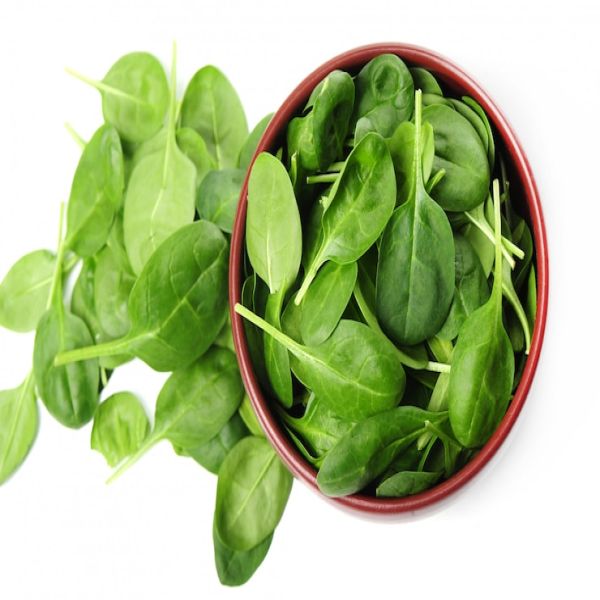Spinach
Spinach is a nutritious green leafy vegetable that contains fibers ,proteins , Vitamin A,C antioxidants and minerals which are vital for healthy ageing.
updated on:2023-06-02 00:32:55
Compiled & Medically
reviewed by
Dr.Sanjana.V.B. Bhms.
Dbrm.Cdn
Spinach helps healthy ageing
Spinach, (Spinacia oleracea), hardy leafy annual plant of family Amaranthaceae, widely grown in Asia, northern Europe and the United States and used as a food item. The edible leaves are arranged in a rosette, from which a seed stalk emerges. The simple leaves are somewhat triangular or ovate and may be flat or puckered
Spinach was noticed as a nutritious vegetable component of diet in 1920s due to its high content of iron ,vitamins A and C. Spinach is served as a salad green and as a cooked vegetable. Spinach leaves contain oxalates, and excessive consumption may lead to kidney stones; steaming or boiling spinach can reduce the oxalate levels in spinach.
A number of other leafy greens are also known as spinach. Sissoo spinach, also called Brazilian spinach (Alternanthera sissoo), is in the same family as true spinach and is used as a vegetable. Mountain spinach (Atriplex hortensis) is cultivated for its young leaves. Lagos spinach, or silver cockscomb (Celosia argentea), is an important food crop in West Africa, where it is grown for its nutritious leafy greens. Perpetual spinach, a variety of chard (Beta vulgaris), also belong to the family Amaranthaceae.
Spinach, (Spinacia oleracea] is a nutrient rich vegetable which contains fibers ,proteins , Vitamin A,C and K and minerals potassium,calcium , copper,iron,magnesium, manganese ,selenium and zinc.
Most of the carbohydrates in spinach are fibers.It contains some amount of proteins also. There are 2 grams of protein in three cups of fresh spinach.It is a low glycaemic index food and help weight loss.
The fat content in spinach very negligible. Therefore , adding a little healthy fat while cooking or preparing spinach may help your body absorb more of its beta-carotene.
Spinach
contains Chlorophyll, which has strong antioxidant effects and anti-cancer
properties.
Vitamins A and C of spinach help prevent age-related macular degeneration (AMD) and they are very effective antioxidants.
Nutritional value of spinach apart of from fibers and proteins are as follows:
Vitamins
|
Thiamin
[Vitamin B1] 0.023 mg |
|
Riboflavin
[Vitamin B2] 0.057
mg |
|
Niacin
[Vitamin B3] 0.217 mg |
|
Pantothenic
acid [Vitamin B5] 0.020 mg |
|
Vitamin
B6 0.059
mg |
|
Folate, DFE [Vitamin B9]
58.20 mcg |
|
Vitamin
C [Ascorbic acid] 8.4
mg |
|
Vitamin
K 144.9
mcg |
Minerals
|
Calcium |
29.70 mg |
|
Copper |
0.04 mg |
|
Iron |
0.81 mg |
|
Magnesium |
23.70 mg |
|
Manganese |
0.269 mg |
|
Phosphorus |
14.70 mg |
|
Potassium |
167.40 mg |
|
Selenium |
0.30 mcg |
|
Sodium |
23.70 mg |
|
Zinc |
0.16 mg |
Spinach also contains beta carotenes,lutein and zeanthin .beta carotenes have antioxidant property.
Health benefits of spinach as an anti-ageing food
Spinach contains Chlorophyll, which has strong antioxidant effects and anti-cancer properties.
Vitamins A and C of spinach help prevent age-related macular degeneration (AMD).It also improves vision.
It helps to lower Blood Pressure . the
potassium content of spinach helps to maintain as well as lower blood pressure.
Spinach is an excellent
source of lutein, an antioxidant known to protect against age-related eye
diseases such as macular degeneration and cataracts.
Research
study has shown that women who had a higher dietary intake of lutein were 23%
less likely to develop cataracts than those who had a low-lutein diet.
Lutein has also been shown to help preserve cognitive abilities,memory ,comprehension etc. Studies of older population have shown that those with higher lutein levels had better verbal fluency, memory, reasoning ability, and processing speed than those with low amounts of the nutrient.
Spinach
extract is a potential source of natural antioxidants and its consumption
improves antioxidant status[2].Spinach is an excellent source of vitamin A[ as
beta carotenes],vitamin C and vitamin b
complex and vitamin K.
Antioxidants
,vitamin A,C help to protect you from
infections,boosting your immunity which wanes with advancing age.
Vitamin C also help boosting collagen formation on your skin and muscles.Collagen is very important for skin tightness and healthy supple appearance.
Vitamin K ,calcium and magnesium support your bone health, undergoing degenerative changes with ageing.
Although
spinach is good source of calcium it is not readily absorbable as the milk
calcium is.Spinach Ca is much less readily available than milk Ca.[3]
Spinach is high in calcium and oxalate, which prevents a lot of the calcium from being absorbed into the body (4].
Spinach being a good source of iron boost the health of circulatory system ,helps formation of haemoglobin and blood cells.It prevents iron deficiency anaemia.
Iron,zinc
and selenium also improves the health of scalp skin, hair and hair
follicles supporting hair growth.
Spinach contains most of the B-complex vitamins and thus help to support the health of your cardiovascular and nervous system.It improves cognitive powers in elderly.
Advancing age is associated weight gain.Most of the carbohydrates in spinach are fibers.It contains some amount of proteins also. There are 2 grams of protein in three cups of fresh spinach.It is a low glycaemic index food and help weight loss. even diabetic people can take spinach in their diets.
As spinach is full of antioxidants it prevents free radical mediated oxidative damage to your body. Ageing involves various types of free radical mediated . Spinach help in fighting against free radicals.
REFERENCES
1.
https://www.nutritionvalue.org/Spinach%2C_raw_nutritional_value.html
2.
https://www.ncbi.nlm.nih.gov/pmc/articles/PMC3999804/
3.
https://pubmed.ncbi.nlm.nih.gov/3354496/
4.
https://pubmed.ncbi.nlm.nih.gov/2801588/
5.
https://www.britannica.com/plant/spinach


Recommended For You
Spinach
Spinach is a nutritious green leafy vegetable that contains fibers ,proteins , Vitamin A,C antioxidants and minerals which are vital for healthy ageing.
Related Links

sdfgh
